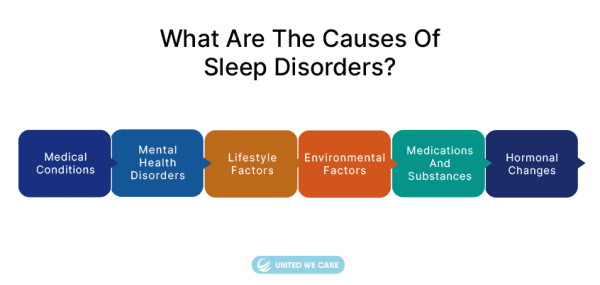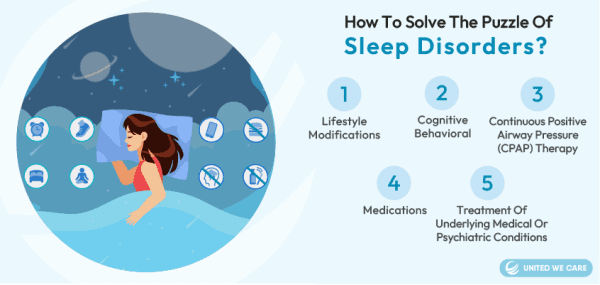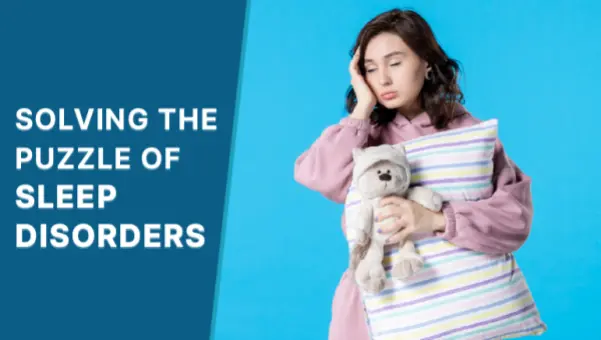Introduction
Do you feel that your sleep quality, the duration you sleep for, and the time you sleep at is off? It’s possible that you are dealing with some type of sleep disorder. These disorders can cause you to have issues falling asleep, staying asleep, or feeling that you’ve rested properly, even if you lay in bed for 8 hours. Sleep disorders can make you feel very tired during the day and cause issues with the way you think and pay attention to details and other health concerns. Proper diagnosis and treatment can help you majorly.
“Sleep is the golden chain that ties health and our bodies together.” -Thomas Dekker [1]
What are Sleep Disorders?
I remember when I was a kid, I used to fight with my mother when she would tell me that it was sleep time. It wasn’t until I became an adult that I realized how important sleep is. For people who are dealing with some kind of sleep disorder, this becomes even more true.
Sleep disorders can upset your regular sleep pattern and can impact the quantity and quality of your sleep. While there are 80 different kinds of sleep disorders, they can be classified into six categories that we will discuss in the article.
But did you know that many people never get a formal diagnosis of their sleep disorders? I had an uncle who would feel like he was choking during his sleep. It wasn’t until he developed a heart condition that he informed the doctor about his issue and got his diagnosis of facing a sleep disorder.
Sleep disorders can affect your mental, emotional, and physical well-being drastically [2]. So, if you face any symptoms that I’ll highlight in this article, then please get yourself a proper diagnosis and treatment.
What are the Causes of Sleep Disorders?
Let’s begin by understanding the cause of sleep disorders first [3]:

- Medical Conditions: If you have any medical conditions like asthma, nerves-related concerns, arthritis, etc., then it’s possible for you to have some sleep disorder, as these conditions can disturb your sleep. For example, my mother has arthritis and chronic pain and wakes up from the pain quite often.
- Mental Health Disorders: When it comes to mental health issues, it can be that sleep concerns contribute toward them and vice versa. If you have conditions like anxiety, depression, post-traumatic stress disorder (PTSD), etc., then you can have a night of disturbed sleep.
- Lifestyle Factors: If you are someone who does not follow a suitable routine before sleeping or make sure that the environment in the bedroom is suitable for you to sleep in, then surely you will face disturbed sleep. Plus, if you have irregular sleep schedules, either by choice or by the force of your job profile, then also it’s possible that you face difficulty in sleeping. Lack of exercise and excessive use of caffeine can be additional contributors.
- Environmental Factors: If you try to sleep while there is noise and too much light in the bedroom, then you will surely face difficulty in sleeping. Also, if you have an unsupportive mattress or a room that is too hot, then your mind will keep you awake and try to avoid getting you into an uncomfortable position.
- Medications and Substances: Sometimes doctors give you medicines that can change your sleep patterns – either you would be sleeping too much or too little. Also, your sleep can get disturbed if you use any substances like alcohol, nicotine, cocaine, etc.
- Hormonal Changes: Hormones are chemicals that our body releases. There are certain periods in our lives, such as pregnancy or menopause in women or andropause in men, that can impact sleep patterns.
What are the Symptoms and Different Types of Sleep Disorders?
Depending upon the symptoms you are facing, you could have a particular kind of sleep disorder. As I said, although there are 80 kinds of sleep disorders, they can all be put into six categories [4] [5]:
- Insomnia: If you have difficulty falling asleep, staying asleep, or feeling that you’ve had a restful sleep, then probably you have insomnia. You can experience insomnia if you have stress, anxiety, depression, or taking any medicines.
- Sleep Apnea: When you face interruptions in breathing during sleep, you probably have a sleep disorder called Sleep Apnea. Your breathing can be interrupted due to your air passage being blocked. This blockage can stop the brain from signaling the muscles that they need to breathe. You may even observe it as snoring. When you suffer from sleep apnea, you can face daytime sleepiness. You may also have an increased risk of heart-related diseases.
- Narcolepsy: Narcolepsy is a nerves-related disorder that causes excessive daytime sleepiness and sudden, uncontrollable urge to fall asleep. If you suffer from narcolepsy, then you might even have a sudden loss of muscle tone and sleep paralysis.
- Restless Legs Syndrome (RLS): Uncomfortable sensations in the legs are called RLS. You may have a “creepy” or “itchy” feeling in your legs and get an irresistible urge to move your legs. When you are sitting or resting for a while, RLS can get triggered. This urge to move your legs can interfere with your sleep.
- Parasomnias: Parasomnias are a combination of sleep disorders that cause you to have abnormal movements, behaviors, or experiences during sleep. They include sleepwalking, night terrors, sleep talking, clenching jaws, etc.
- Circadian Rhythm Disorders: When you travel for long periods and feel jet-lagged, your sleep-wake cycle can get disturbed. These disturbances of the sleep-wake cycle are called circadian rhythm disorders. Another situation where you could face this disturbance is when you work in shift jobs.
How Do You Solve the Puzzle of Sleep Disorders?
When I tell you that everything has a solution, it’s true. The treatment for sleep disorders can vary depending on the specific condition and its underlying causes [6]:

- Lifestyle modifications: You can begin by establishing a consistent sleep schedule. Tell yourself that, let’s say, 11 pm is a hard stop for you to wrap up your work. In 30 minutes, you can be done with your pre-sleeping rituals, like setting a cool and comfortable temperature, making sure your bed is comfortable, and practicing activities like meditation that can induce sleep. During the day, you can add a good exercise routine to your schedule, which will contribute to getting a restful sleep.
- Cognitive Behavioral Therapy for Insomnia (CBT-I): Some psychologists use CBT-I to help you identify and modify your thoughts and behaviors that contribute to insomnia. CBT-I is quite effective in improving your sleep quality and the duration for which you sleep.
- Continuous Positive Airway Pressure (CPAP) therapy: CPAP is mainly used for sleep apnea as it helps manage the blockage in your air passage. During the course of this therapy, you will have to wear a mask that helps to keep the air passage open during sleep. Famous actor Carrie Fisher has openly spoken about using CPAP therapy for her sleep apnea.
- Medications: Some doctors also suggest medicines to manage specific sleep disorders. You will have to take these medications for a brief time and under the supervision of your doctor. Overusing them can have adverse effects. So, I would suggest that you take these medicines cautiously.
- Treatment of Underlying Medical or Psychiatric Conditions: As I said earlier, health conditions and sleep issues go hand-in-hand. Your health issues can cause sleep problems and vice versa. So maybe your doctor can look into treating the physical and mental issues first, and automatically, your sleep disturbances can get sorted.
Conclusion
Sleep is an important part of our lives. However, any issues with sleep can lead to mental, physical, and emotional issues. These issues can get converted into sleep disorders. However, many people go without getting a proper diagnosis. However, by understanding the types of disorders and their underlying causes, you can identify the kind of help you need to take.
If you face any sleep-related issues, contact our expert counselors or explore more content at United We Care! At United We Care, a team of wellness and mental health experts will guide you with the best methods for your well-being. Additionally, you can join the Sleep Wellness Program and Advanced Wellness Program for Sleep Disorders at United We Care.
References
[1] “SCIENCE of SLEEP – BAYSIDE SLEEP HEALTH,” SCIENCE of SLEEP – BAYSIDE SLEEP HEALTH. https://makesleepyourfriend.com/?page_id=53
[2] L. A. Panossian and A. Y. Avidan, “Review of Sleep Disorders,” Medical Clinics of North America, vol. 93, no. 2, pp. 407–425, Mar. 2009, doi: 10.1016/j.mcna.2008.09.001.
[3] S. Chokroverty, “Sleep Disorders,” DeckerMed Neurology, May 2015, Published, doi: 10.2310/neuro.6176.
[4] @ClevelandClinic, “Common Sleep Disorders: Symptoms, Causes & Treatment,” Cleveland Clinic. https://my.clevelandclinic.org/health/articles/11429-common-sleep-disorders
[5] S. Bailes et al., “Sleep disorder symptoms are common and unspoken in Canadian general practice,” Family Practice, vol. 26, no. 4, pp. 294–300, Jun. 2009, doi: 10.1093/fampra/cmp031.
[6] S. Ancoli-Israel and L. Ayalon, “Diagnosis and Treatment of Sleep Disorders in Older Adults,” The American Journal of Geriatric Psychiatry, vol. 14, no. 2, pp. 95–103, Feb. 2006, doi: 10.1097/01.jgp.0000196627.12010.d1.





